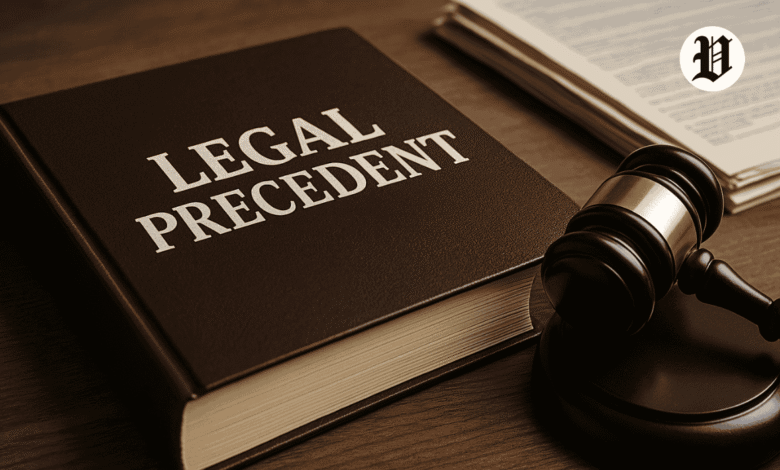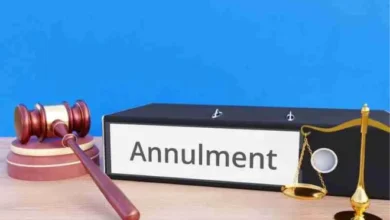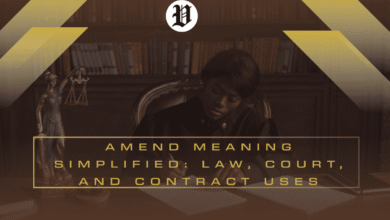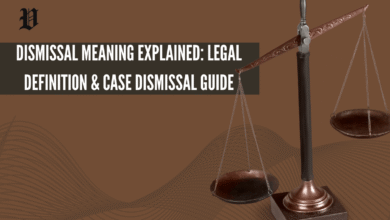Legal Precedent Meaning, Definition, and Why It Matters in Law

Let me take you back to a time when the Supreme Court handed down a decision that, for generations, locked in a painful status quo. It was 1896, Plessy v. Ferguson, the case that birthed “separate but equal” and kept Black and white Americans worlds apart in schools, trains, you name it. Segregation wasn’t just tolerated; it was the law. But here’s where it gets riveting: almost 60 years later, in 1954, a group of brave families challenged that in Brown v. Board of Education. The Court didn’t just tweak the rules—they smashed them, ruling that separate schools were never equal and violating the Constitution’s promise of fair treatment. That flip wasn’t pulled out of thin air. It was legal precedent doing its heavy lifting, showing how yesterday’s rulings can either anchor us or propel us forward. Precedent is the quiet force behind so much of what we take for granted in justice. Stick with me as we unpack what it really is, why it packs such a punch, and how it sneaks into our everyday lives.
What Is Legal Precedent?
Okay, let’s cut to the chase. At heart, legal precedent is all about courts borrowing from their own history books. When a judge faces a thorny issue, they glance back at how similar squabbles were settled before. The precedent definition in law? It’s basically a rule or guideline drawn from an old case that helps shape the new one—especially if the facts line up.
Want it simpler? The precedent definition simple version is: “What happened last time should clue us in for this time.” Precedent meaning, in plain speak, is consistency—nobody wants the law playing favorites based on the calendar. And to define precedent law a bit more officially, it’s that stack of past decisions that lawyers trot out in court to say, “Hey, we’ve been here before, and here’s how it went.”
I chuckle every time I spot folks fumbling the spelling online—”precident” or “precednt,” anyone? It’s precedent, folks, with that rogue ‘e’ hiding in the middle. But hey, typos aside, it’s the same beast: the glue that makes law feel reliable.
Legal Precedent Meaning: Why Legal Precedent Matters
Why should you care about this stuff if you’re not knee-deep in legalese? Because without precedent, our courts would be like a game of legal roulette—same facts, wildly different spins. Precedent steps in to level the field, making sure the guy in your town gets the same shot at justice as someone across the country.
This all ties back to the doctrine of precedent, that fancy term for stare decisis, which roughly translates to “don’t mess with what’s already settled.” It’s the law of precedent in action: judges nod to what’s come before unless the world’s flipped upside down. Think of the 1966 Miranda v. Arizona case—yeah, the one that gave us those iconic cop warnings about your rights. That ruling set case precedence nationwide, turning a single decision into a shield for suspects everywhere. It’s a perfect snapshot of precedence in law definition: not a straitjacket, but a smart guardrail.
Bottom line? Precedent builds trust. It whispers to everyone—from everyday folks to big corporations—that the rules aren’t rigged to change on a dime. And in a messy world, that’s no small thing.
Just to drive it home, here’s a little table on why this matters in the trenches:
| Why It Counts | In a Nutshell | How It Hits Home |
| Keeps Things Even | Like cases get like calls, no wild swings | You know what to expect in court |
| Saves Headaches | No starting from zero every time | Faster resolutions, less drama |
| Boosts Faith in the System | Shows the law’s fair, not fickle | More folks actually show up for trials |
| Sparks Smart Evolution | Builds on the old while eyeing the new | Rights expand without total chaos |
Types of Precedent
Not every precedent carries the same swagger. They’ve got levels, like a hierarchy in a courtroom drama. The boss level is binding precedent—lower courts have to snap to it. If the Supreme Court drops a bombshell on, say, free speech, you can’t just shrug it off in a local hearing. That’s precedential law calling the shots.
Then you’ve got persuasive precedent, the smooth-talker of the bunch. It’s not make-or-break, but it can tip the scales. Maybe a judge in Oregon eyes a clever ruling from Ontario and thinks, “Not bad, I’ll borrow that logic.” Legal precedence here is more art than science—influential, but optional.
Grasping these helps nail down set a precedent meaning: it’s about dropping a marker that either locks things in or nudges the conversation. Keeps the whole machine humming without grinding to a halt.
For a quick visual, peek at this breakdown:
| Precedent Flavor | What’s the Deal? | When You’d See It |
| Binding | No ifs, ands, or buts—follow it or else | Federal appeals citing SCOTUS |
| Persuasive | Good advice, take it or leave it | A state judge nodding to another state’s win |
How Precedents Are Created
Ever wonder how these things even get born? It’s not magic; it’s just courts doing their thing. Picture a heated trial: lawyers duke it out, the judge pores over the mess, and boom—a ruling lands. If it’s meaty enough—tackling fresh ground or twisting an old angle—it gets etched into the books as published case law.
From there, it’s fair game. Next case rolls in, and some sharp attorney flips open the reports: “Remember this one?” To set a precedent meaning real impact, that decision has to shine a light on a principle that sticks. What does it mean to set a precedent? It’s like planting a flag on a hill—others will reference it, build on it. Take Obergefell v. Hodges in 2015: six folks fighting for marriage equality didn’t just win their day; they redrew the map for love and law across America.
It’s this step-by-step layering that turns raw disputes into something enduring.
Breaking or Overturning Precedent
Here’s the twist: precedents can crumble. They’re tough, but not invincible. Overturning precedent is like admitting the family recipe’s gone stale—rare, but sometimes necessary when society outgrows it. The opposite of precedent? Not rebellion, but a bold course correction.
Roe v. Wade’s a gut-punch example. Back in 1973, it carved out abortion as a private right, standing tall for half a century. Then 2022’s Dobbs decision yanked it away, handing the reins to states. Folks still argue over it, but it proves: Can a precedent be overturned? You bet, with mountains of reasoning and a nod to changed times.
So, what does precedent mean in law on shakier ground? It’s a reminder that justice isn’t frozen—it’s alive, wrestling with us as we go.
Everyday Examples of Precedent
Don’t think this is all ivory-tower talk. Precedent’s rubbing elbows with us daily. In the office, HR policies on bullying often echo cases like Meritor Savings Bank v. Vinson from ’86, which spelled out what “hostile” really means. Contracts in business? They’re riddled with nods to old settlements that set the bar for “fair play.”
Shoot, even referees in basketball huddle over replays, citing past calls to keep the game’s spirit intact. Or how about privacy rules for apps? They lean hard on rulings that first defined “unreasonable search.” These examples of legal precedents prove it’s not some distant concept—it’s the undercurrent in how we hash out conflicts, big and small.
A few standouts in a handy table:
| Landmark Case | When It Hit | What It Sparked | Lingering Echo |
| Brown v. Board | 1954 | Nixed school segregation | Civil rights blueprint |
| Miranda v. Arizona | 1966 | Miranda rights for the arrested | Every cop show ever |
| Obergefell v. Hodges | 2015 | Same-sex marriage for all | Weddings without borders |
Common Questions & Misconceptions
Look, I’ve fielded my share of head-scratchers on this. Spelling’s a perennial trap—”prescedent” or “precednet”? Nah, precedent’s the winner. Best way to wrap your head around it? Imagine precedent as that trusty old trail through the forest—you stick to it ’cause blazing a new one every hike sounds exhausting.
Mix-up alert: precedent and precedence aren’t twins. Precedent’s your legal backstory; precedence is just “who goes first,” like at a dinner party.
And if there’s no precedent? Courts improvise—dredge up statutes, stitch together close calls, maybe even peek overseas. Could birth something shiny and new.
In the end, precedent’s what keeps the law from feeling like a cold machine. It’s stories from real people, bent and mended to fit our messy world.
People also see: Fiduciary Meaning, Legal Definition, and Duties ExplainedFAQs
What is the definition of precedent in law?
Straight up, the definition of precedent in law is a past court’s call that lights the way for similar fights ahead. Common law’s secret sauce.
What does legal precedent mean in simple terms?
Legal precedent mean in simple terms: it’s cribbing notes from old cases to tackle today’s headaches—smart recycling for justice.
What is the doctrine of precedent?
The doctrine of precedent? That’s stare decisis, the “stand by your word” rule that keeps courts from flip-flopping willy-nilly.
What is a precedent-setting case?
A precedent-setting case is the game-changer, the one that drops a fresh rule and watches it spread like wildfire.
Can a precedent be overturned?
Oh yeah, precedents can be overturned—higher courts pull the plug if the old one’s outdated or dead wrong.
What is the difference between precedent and precedence?
Precedent’s legal lore guiding tomorrow; precedence is plain old “line order,” nothing court-related.
What are examples of legal precedents?
Prime examples of legal precedents: Plessy v. Ferguson (segregation’s green light, later scrapped) or Roe v. Wade (abortion shield, then shattered).
What does it mean to set a precedent?
To set a precedent means you’re the pioneer, laying down a rule that folks will quote for years—like starting a trend that sticks.
Why is precedent important in law?
Precedent is important in law ’cause it doles out fairness, cuts the chaos, and lets the system learn without constant reboots.
What happens if there is no precedent?
No precedent? Judges roll up sleeves—lean on laws on the books, mash up look-alikes, and maybe cook up a trailblazer.





One Comment